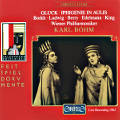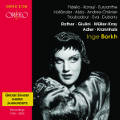ORFEO International
News
May 2011
Inge Borkh 90th Anniversary
During the 1950s and 1960s, international opera houses looking for a hochdramatisch soprano capable of doing justice to the roles of Salome or Electra in Strauss’s operas of the same name or to 
Inge Borkh
Foto: Thorsten Schreierthe part of the Dyer’s Wife in the same composer’s Die Frau ohne Schatten needed to look no further than Inge Borkh, who was regularly heard in these roles at the Vienna and Munich State Operas, the Royal Opera, Covent Garden, and the Metropolitan Opera, New York. 
C 564 012 I

C 456 972 I

C 342 932 I

C 428 962 I

C 714 061 BAnd yet the artistic range of a singer whose ninetieth birthday we are delighted to celebrate on 26 May 2011 goes far beyond these signature roles and even beyond the world of opera and classical vocal music in general. On Orfeo’s Festspieldokumente label she may be heard as Electra in Dimitri Mitropoulos’s legendary recording from the 1957 Salzburg Festival. Five years later she appeared as Electra’s mother, Clytemnestra, not, however, in Strauss’s opera but in a very different work written in an altogether different style: Gluck’s Iphigénie en Aulide. Performed under the direction of Karl Böhm, it was sung in German in keeping with a practice still common in Salzburg at this time. Inge Borkh had made her Salzburg Festival début in 1955 in a contemporary work, Werner Egk’s Irische Legende, conducted by George Szell. The Orfeo catalogue also includes two recordings from Munich that more or less define the chronological framework of the singer’s career: a Salome recorded in the Prinzregententheater under Joseph Keilberth in 1951 and a Narrator in Brahms’s Die schöne Magelone recorded in the studios of Bavarian Radio half a century later. This last-named recording with the baritone Konrad Jarnot and the pianist Carl-Heinz März is a fine example of the way in which long after she had taken her leave of the operatic stage, Inge Borkh continued to captivate audiences with her outstanding gifts, reciting and declaiming spoken texts. In doing so she was in fact returning to her roots as an actress, for it was in the spoken theatre that she had begun her career in the late 1930s. That this was arguably no more than a minor detour is clear from her two early recordings of hit songs and operettas from 1936/8 that feature in a varied „historical“ portrait of the singer. This is above all a hugely impressive survey of Inge Borkh’s operatic repertory, beginning with her earliest successes in Berlin, where Menotti’s The Consul took on peculiar relevance not only for its audiences but also for Inge Borkh herself: after all, she was the daughter of a Swiss consul with Jewish roots who was twice imprisoned during the Third Reich. The album also includes excerpts from recordings that may be less familiar to today’s opera lovers but which were none the less made in leading houses. In the Italian repertory, for example, she is heard as Aida alongside her real-life husband, the baritone Alexander Welitsch.
top |